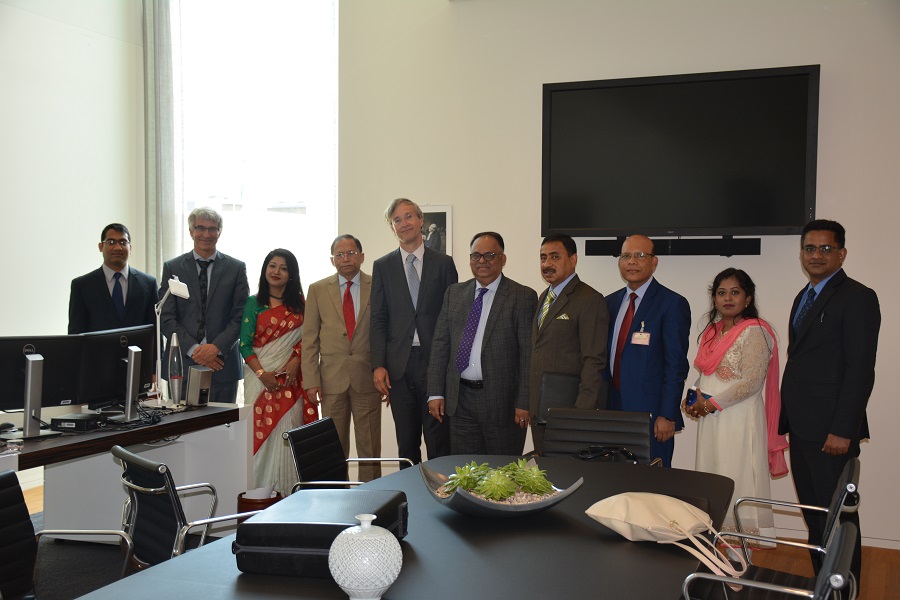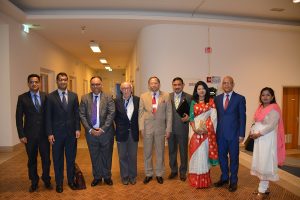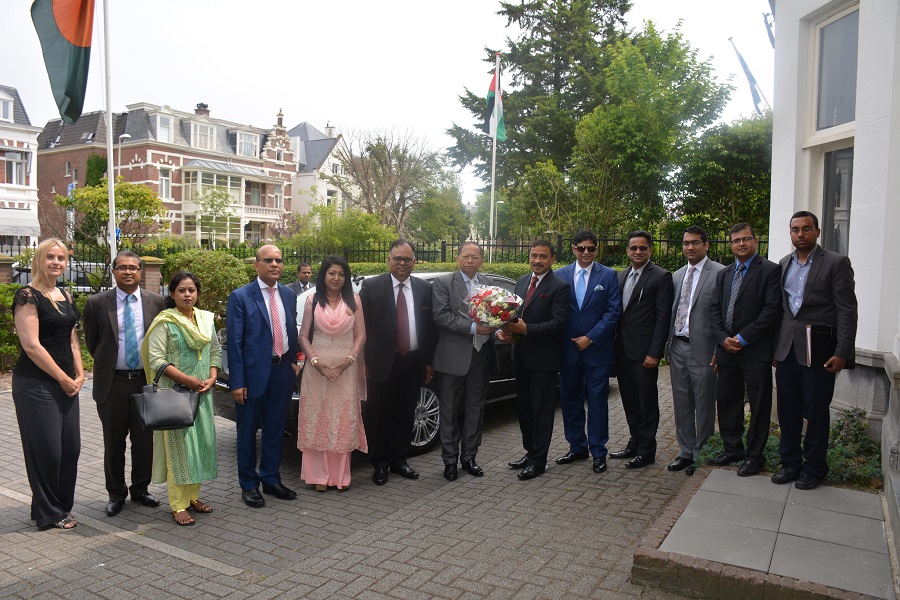The International Criminal Court (ICC) in The Hague praised Bangladesh for her commitment to the Rome Statute and determination to bring an end of the impunity to the crimes against humanity and war crimes. The President Judge Silvia Fernandez de Gurmendi and Deputy Prosecutor James Stewart of the ICC expressed it to the Chief Justice of Bangladesh Justice Surendra Kumar Sinha, when he visited the ICC this morning with a judicial delegation of Bangladesh. Justice Mohammad Ashfaqul Islam, Justice of the Supreme Court of Bangladesh and Bangladesh Ambassador to the Netherlands Sheikh Mohammed Belal also joined the Chief Justice during his meetings with the President and Deputy Prosecutor of the ICC.

The Chief Justice of Bangladesh expressed unequivocal support for the Rome Statute and to the ICC. The Chief Justice of Bangladesh updated the ICC about Bangladesh’s ongoing efforts to bring to justice those who committed war crimes and crimes against humanity during our War of Liberation in 1971 to end the culture of impunity to crimes against humanity. He stressed that this effort has created a new paradigm in international criminal justice by allowing purely domestic courts the mandate to hold trials for the internationally defined crimes in full conformity with the ‘complementarity’ principle of the Rome Statute. The Chief Justice also assured the ICC that the International Crimes Tribunal Bangladesh (ICT-BD) and the Bangladesh Supreme Court as the appeal authority has maintained international standards in discharging their judicial mandates for the trail of the perpetrators of war crimes and crimes against humanity committed in 1971. The Chief Justice also thanked the Rome Statute for its contribution to the domestic legislation of Bangladesh for war crimes and crimes against humanity. The ICC President termed the experience of Bangladesh for the trial of the perpetrators of the war crimes and crimes against humanity important for the ICC and shared her desire to continue dialogue with the national justice system to enrich each other’s judicial proceedings. The ICC President also highlighted importance of reparative justice for the victims of war crimes and crimes against humanity. Referring to his visit to International Crime Tribunal Bangladesh in 2015, the Deputy Prosecutor of ICC appreciated the trial proceedings in the ICT-BD and underscored the importance of independence and impartiality of the prosecution.

Expressing Bangladesh’s commitment to work towards preventing sexual and gender-based violence during armed conflicts, the Chief Justice expressed interest to host a regional/ international seminar in Bangladesh for the promotion of universality of the Rome Statute in the Asian region and sharing Bangladesh’s national experience in ensuring justice for victims of sexual and gender-based violence in light of the ICC’s Policy Paper on Sexual and Gender-Based Crimes.
The 6-member judicial delegation from Bangladesh is currently visiting The Hague at the invitation of the President of the Supreme Court of the Netherlands Mr. Marteen Feteris. On 19 June, the Bangladesh judicial delegation visited the Supreme Court of the Netherlands to learn more about the digitalization of the Dutch court system including the Supreme Court and the lower courts. The Netherlands has introduced from this year online based case filing. Individuals and companies in the Netherlands can now submit their documents digitally in cases brought before the civil and administrative courts. The litigants can follow each step of the process via a digital dossier. The President of the Supreme Court of the Netherlands and Bangladesh Chief Justice shared their experiences in digitalization of respective court systems.

The Chief Justice of Bangladesh also visited the UN Mechanism for International Criminal Tribunals (MICT) and held a meeting with its President Judge Theodor Meron on 19 June 2017. At the meeting, both the President of the MICT and Bangladesh Chief Justice shared their experiences for the trial of perpetrators of war crimes.
The Bangladesh judicial delegation is scheduled to visit Peace Palace, which houses the Permanent Court of Arbitration and the International Court of Justice and the Asser Institute, a prominent think-tank in the Netherlands which conducts research on international jurisprudence. Hon’ble Chief Justice would attend an invitation for iftar-dinner at the Bangladesh House on 21 June 2017 being hosted in his honour by Ambassador Sheikh Mohammed Belal before the Chief Justice’s leaving the Netherlands.

Be the first to comment